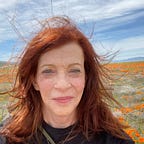What It Means to Live Among Others
Individualism is just fine if you live on an island in the middle of nowhere
The other day, I came to a stop at an intersection a few miles from my house. The intersection is a whopper, with four wide, divided streets crossing, creating a huge starburst of concrete. As far as I know, there has never been a stoplight at this intersection. It’s controlled only by stop signs. Drivers proceed through it in an orderly, civilized way. You might have to sit a while, since there are often as many as eight cars waiting to work their way across, but I’ve never seen anyone jump their place in the commonly understood first-in-first-out process. By the way, this intersection is in a rich part of Los Angeles, where the rate of ego and assholery is certainly high, and many of the cars coasting to a stop and waiting their turn are either flashy sports cars or posh sedans. Not to make a sweeping assumption, but they are cars that probably don’t like to idle at stop signs. But they do.
I always get a lump in my throat at the intersection. I’m overwhelmed by a sense of gratitude and awe that people can manage to self-police and make what could be a very dangerous intersection quite benign. A jerk could roar through without even stopping, or impatiently shoulder in front of a car that had arrived earlier, but I’ve never seen that happen. The place functions as a little model of public responsibility; it proves that if we take into account the safety of everyone at the intersection, it works quite well. At worst, you might have to wait for fifteen seconds before proceeding, but you can be confident that you are probably not going to get broadsided by someone who has chosen to break the rules, because everyone seems to appreciate that stopping and being careful is essential.
This is how society works, if and when it works. Sometimes you take a tuck in your personal freedom in order to keep civilization on track. The alteration is pretty tolerable. I get to drive my car where I want to drive it — individual freedom — but whenever I encounter someone else driving a car, I have agreed to make decisions about how we will share the road that will have mutually beneficial outcomes — communitarian consideration, or what might also be called public health. It’s easy. Most of the time, my daily…
